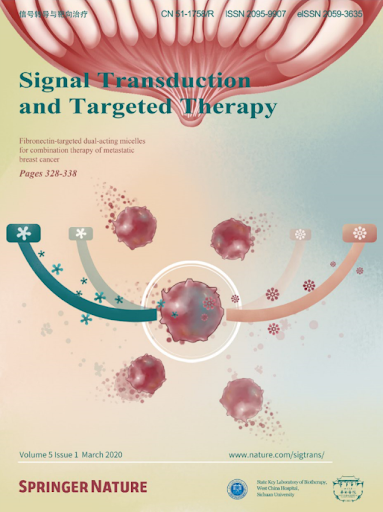食管鳞状细胞癌免疫系统单细胞图谱预测免疫治疗反应。
IF 52.7
1区 医学
Q1 BIOCHEMISTRY & MOLECULAR BIOLOGY
引用次数: 0
摘要
食管鳞状细胞癌(ESCC)在一个高度相互作用的肿瘤微环境(TME)中发展,形成治疗反应。我们利用大量细胞术分析了来自25个ESCC肿瘤、24个邻近非肿瘤组织和23个外周血样本的1000多万个细胞,采用了42种免疫标记物的广泛小组。由此产生的图谱揭示了肿瘤部位CD4 +和CD8 +中心记忆T细胞(TCM)可重复缺乏的分区景观。在共培养实验中,重新引入患者来源的中草药恢复了抗肿瘤免疫,证明了它们在体外的细胞毒能力,并表明它们与未来治疗探索的潜在相关性。髓系分析鉴定出PD-L1 +肿瘤相关巨噬细胞(tam)是临床获益的相关因素;体外PD-L1阻断将tam重编程为促炎状态,表明其药理可塑性。值得注意的是,CD39 +肿瘤浸润T细胞在不同癌症类型中均与良好的预后和对PD-1阻断的反应性增加相关。CD39的功能性抑制破坏了细胞毒性t细胞的活性,强调了它作为免疫功能障碍标志物和有希望的治疗靶点的双重作用。总的来说,我们的研究结果提供了ESCC的全面免疫景观,突出了关键的免疫缺陷和靶向干预的机会。获得的见解强调了针对TME的特定免疫特征定制免疫疗法的潜力,可能会彻底改变ESCC患者的治疗模式。这项研究为更细致地理解和操纵对优化癌症免疫治疗至关重要的免疫元素奠定了基础。本文章由计算机程序翻译,如有差异,请以英文原文为准。
Single-cell atlas of the esophageal squamous cell carcinoma immune ecosystem to predict immunotherapy response.
Esophageal squamous cell carcinoma (ESCC) evolves within a highly interactive tumor microenvironment (TME) that shapes therapeutic response. We utilized mass cytometry to analyze over 10 million cells from 25 ESCC tumors, 24 adjacent nontumor tissues, and 23 peripheral blood samples, employing an extensive panel of 42 immune markers. The resulting atlas reveals a compartmentalized landscape with a reproducible paucity of CD4⁺ and CD8⁺ central memory T cells (TCM) in tumor sites. Reintroduction of patient-derived TCMs restored antitumor immunity in coculture assays, demonstrating their cytotoxic capacity in vitro and suggesting their potential relevance for future therapeutic exploration. Myeloid profiling identified PD-L1⁺ tumor-associated macrophages (TAMs) as correlates of clinical benefit; ex vivo PD-L1 blockade reprogrammed TAMs toward proinflammatory states, indicating pharmacological malleability. Notably, CD39⁺ tumor-infiltrating T cells were consistently associated with favorable prognosis and increased responsiveness to PD-1 blockade across cancer types. The functional inhibition of CD39 impaired cytotoxic T-cell activity, underscoring its dual role as a marker of immune dysfunction and a promising therapeutic target. Collectively, our findings provide a comprehensive immune landscape of ESCC, highlighting key immunological deficits and opportunities for targeted interventions. The insights gained underscore the potential of tailoring immunotherapies to the specific immune profiles of the TME, potentially revolutionizing treatment paradigms for ESCC patients. This study sets the stage for a more nuanced understanding and manipulation of the immune elements critical for optimizing cancer immunotherapy.
求助全文
通过发布文献求助,成功后即可免费获取论文全文。
去求助
来源期刊

Signal Transduction and Targeted Therapy
Biochemistry, Genetics and Molecular Biology-Genetics
CiteScore
44.50
自引率
1.50%
发文量
384
审稿时长
5 weeks
期刊介绍:
Signal Transduction and Targeted Therapy is an open access journal that focuses on timely publication of cutting-edge discoveries and advancements in basic science and clinical research related to signal transduction and targeted therapy.
Scope: The journal covers research on major human diseases, including, but not limited to:
Cancer,Cardiovascular diseases,Autoimmune diseases,Nervous system diseases.
 求助内容:
求助内容: 应助结果提醒方式:
应助结果提醒方式:


